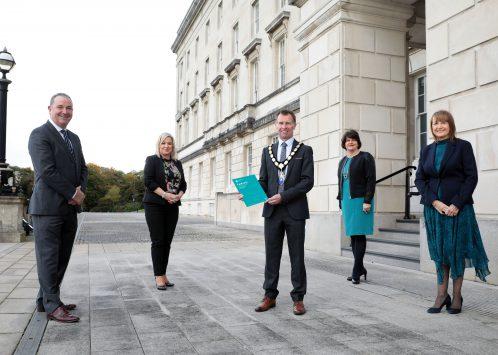2020 has presented business with challenges which just a year ago, could have been considered insurmountable. And while NI Chamber continues to prioritise supporting companies through COVID-19 challenges and Brexit preparations, the time is also right to forward plan our policy priorities for 2021 and beyond.
Next year, the UK will host the 26th UN Climate Change Conference of the Parties (COP26). The talks will bring together heads of state, climate experts and campaigners to agree coordinated action to tackle climate change. The world is facing a climate emergency and at NI Chamber, we believe that businesses have a central role to play in tackling it. In order to do so, they need practical and financial support, as well as site of the cost benefits of carbon alternatives and the real risks that climate change poses to their viability.
To achieve ‘net zero carbon’ by 2050, Northern Ireland requires a competitive, sustainable, reliable and future focused energy infrastructure. Competitor nations are pressing ahead with legislation and projects that move towards net zero and Northern Ireland cannot afford to be left behind.
Excellent progress has been made on electricity generated from renewable sources here, with 47.7% of consumption generated from renewable sources. NI is ahead of almost all European nations on this measure and is to be applauded. However, energy use is much broader than just electricity. We rely heavily on imported oils for almost two-thirds of energy requirements– mainly for transport and heat generation and therefore investment in environmentally friendly technologies, systems and transportation are critical to meeting the net zero goal.
NI Chamber recently published an action plan for economic recovery entitled ‘Thrive’. That report identified five catalysts for economic growth, including ‘Environment’. One of the report’s most prominent asks in this area is for greater support to enable businesses to meet net zero targets. Infrastructure strategy, planning, the rating system, enhanced capital allowances and enterprise supports are key.
We believe that policies should prioritise environmentally friendly projects that support the longer-term goal of decarbonisation. Strategic energy projects such as the North South interconnector must be prioritised and delivered quickly. While decentralised working presents real opportunities to reduce our environmental impact, it also requires investment in high quality digital infrastructure and local public services.
We also believe that enterprise support should be enhanced, focusing on fuel switching, on-site generation and energy storage. Waste management is also part of the solution, in terms of fuel for energy generation and circularity of investment. Electric vehicles and the charging infrastructure will be critical to change how we travel and move goods.
NI Chamber supports a green buildings rate reduction. We propose that the rating system should support those enterprises that are investing in our environmental future, providing discounts for carbon zero or neutral buildings. Those that have the largest negative environmental impacts should also be rated more heavily in order to incentivise better environmental outcomes.
While climate change applies to every single business, some sectors of our economy face particular challenges. ‘Thrive’ stresses the need to support agriculture in particular, helping the sector to deliver local, sustainable and high-quality food and ingredients, minimising food miles and emissions. As well as agri-food, the report makes the case for investment in a high quality, cost-effective public transport system that uses alternatives to heavy oils as fuel and reduces the negative impact of congestion and greenhouse gases on productivity and health.
While these policy asks are urgent, progress will only be achieved with the full co-operation of industry. All businesses have an individual responsibility to make sustainability a central part of company culture, not just because it is the right thing do to but because of the significant opportunities it presents.
To give some practical examples, at Henry Brothers, we devised a sustainable business strategy over five years ago and are currently developing a revised one to align to net zero targets. Already this has seen us make significant investments, including allocating £70,000 to the installation of solar PV Panels at our head office, which will offset 540 tonnes of C02 over the next 20 years. 30% of our company fleet is now hybrid or electric and multiple charge points are now available across our sites. Investment in modernising plant and machinery has already resulted in significant gains, while offsetting 100% of company paper use through the services of Shred Bank equated to a saving of over 40 trees last year.
NI Chamber is absolutely committed to working with policy makers on a new Northern Ireland Energy Strategy that works for businesses. We have already shared in detail some of the very dynamic and forward thinking approaches our members are taking and championing business sustainability will continue to be a key priority in the year ahead.


